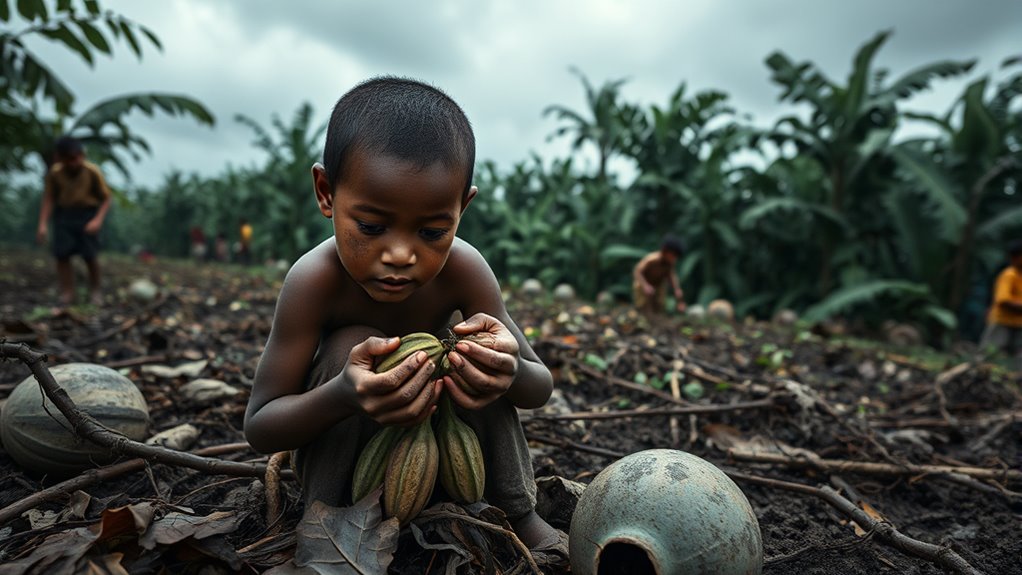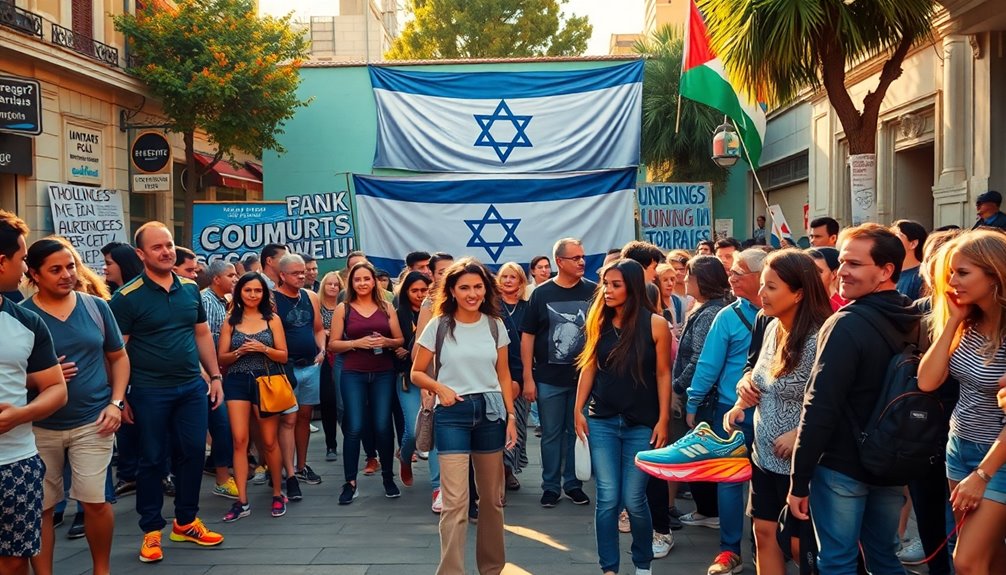The bitter truth behind chocolate is that child labor remains widespread due to complex and unethical supply chains. Many cocoa farms operate under harsh conditions, often exploiting children who work in hazardous environments. Your choices matter: buying products with fair trade or certified labels supports fair wages and safe conditions. If you want to understand how your favorite treats contribute to these issues and how you can help, there’s more to uncover.
Key Takeaways
- Child labor and hazardous conditions are widespread in cocoa farming, often driven by economic hardship and systemic industry issues.
- Unsustainable supply chains enable unethical practices, making consumer awareness and ethical sourcing crucial.
- Certifications like Fair Trade and Rainforest Alliance help ensure cocoa is produced without exploiting children or harming communities.
- Supporting transparent, certified brands encourages industry reform and promotes fair wages and safe working conditions.
- Consumer choices have the power to pressure companies into ethical practices and help combat child labor in the chocolate industry.

Have you ever considered where the chocolate in your favorite bar originates from? Behind that sweet treat lies a complex and troubling reality—one that involves child labor and unethical practices. Many cocoa farmers operate in regions where economic hardship pushes them to cut corners, often resulting in children working long hours in hazardous conditions. This situation isn’t just a moral issue; it’s a systemic problem embedded within the supply chains of the global chocolate industry. As a consumer, your choices can make a difference, especially when you prioritize products that emphasize sustainable sourcing and hold certifications for ethical practices. These labels aren’t just marketing tools—they represent efforts to guarantee that the cocoa you enjoy is produced without exploiting children or harming communities.
Sustainable sourcing means more than just obtaining cocoa beans. It involves practices that support farmers’ livelihoods, promote environmental health, and uphold human rights. When you buy chocolate made from sustainably sourced cocoa, you’re encouraging companies to invest in programs that improve farmers’ income, reduce deforestation, and eliminate child labor. Ethical certification, such as Fair Trade or Rainforest Alliance, provides a way for consumers to identify brands committed to these principles. These certifications require companies to meet strict standards that prohibit child labor and ensure fair wages and safe working conditions. By choosing certified products, you’re actively supporting a system that values human dignity and environmental stewardship.
However, not all chocolates on the shelves carry these labels, and some companies still fall short of ethical standards. It’s important to do your research and look for reputable certifications when shopping. These labels verify that the cocoa was produced with respect for labor rights and environmental sustainability. Supporting brands that prioritize ethical certification means you’re advocating for change within the industry—pushing companies to adopt better practices and hold themselves accountable. Many organizations work tirelessly to combat child labor by working directly with farmers, providing education, and establishing community programs that give children access to schooling instead of work. Additionally, increasing consumer awareness about child labor issues can lead to greater demand for ethically sourced products and put pressure on companies to reform.
In essence, your choices as a consumer can help dismantle the cycle of exploitation. Opting for chocolates with transparent supply chains and ethical certifications isn’t just about enjoying a sweet treat; it’s about standing against child labor and supporting a more just and sustainable cocoa industry. Every purchase becomes a statement—that you care about where your chocolate comes from and the people behind it. By making informed decisions, you contribute to a future where children are free from forced labor, and cocoa farmers are empowered to build better lives.
Frequently Asked Questions
How Do Consumers Unknowingly Support Child Labor Through Their Chocolate Purchases?
When you buy chocolate without verifying its source, you unknowingly support child labor. Many companies lack transparency, so your purchase may fund unethical practices. By choosing fair trade or ethically sourced chocolates, you help guarantee farmers and workers are treated fairly and child labor is eliminated. You can make a difference by being informed and supporting brands that prioritize ethical sourcing, ultimately ending child labor in the industry.
What Are the Economic Factors Driving Child Labor in Cocoa-Producing Regions?
You should understand that poverty cycle and economic dependency drive child labor in cocoa regions. Farmers often rely on cocoa income to survive, with limited access to education or alternative work. This economic dependency makes it hard for families to break free, forcing children into labor instead of school. These factors trap communities, perpetuating child labor, as families prioritize immediate survival over long-term development or ethical concerns.
Are There Any Certifications Guaranteeing Child Labor-Free Chocolate Products?
Did you know that only about 20% of cocoa products are certified as child labor-free? Certification standards like Fair Trade and Rainforest Alliance aim to guarantee ethical sourcing, but they don’t ensure complete child labor elimination. When you choose certified chocolate, you support efforts to improve conditions, but it’s crucial to stay informed and advocate for stricter enforcement of these standards to truly make a difference.
How Effective Are Current International Laws in Combating Child Labor in the Cocoa Industry?
You might wonder how effective current international laws are in fighting child labor in the cocoa industry. Legal enforcement varies, and many laws lack strict implementation, reducing their overall impact. Policy effectiveness depends on countries’ commitment and resources dedicated to enforcement. While some progress exists, gaps remain, and without stronger enforcement and global cooperation, child labor persists. You can help by supporting brands that prioritize transparent, ethical sourcing.
What Can Consumers Do to Help Eliminate Child Labor in Chocolate Supply Chains?
You can help eliminate child labor in chocolate supply chains by supporting fair trade products, which guarantee ethical practices and better wages for farmers. Actively participate in consumer activism by researching brands’ labor policies and choosing those committed to ethical sourcing. Your purchasing decisions send a powerful message, encouraging the industry to prioritize humane treatment and eradicate child labor. Every conscious choice moves us closer to a fairer, more responsible chocolate industry.
Conclusion
You might think choosing fair-trade chocolate solves the problem, but the truth is, supply chains are complex and not always transparent. While buying ethically helps, it doesn’t automatically eliminate child labor from the industry. To truly change things, you need to demand stricter regulations and support organizations fighting for cocoa farmworkers’ rights. Every small action counts, but collective effort is what will finally break the cycle of exploitation behind your favorite chocolate bar.










